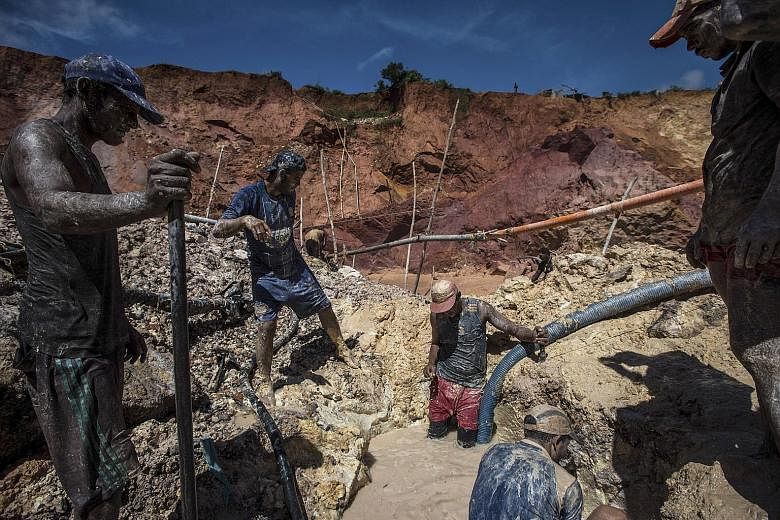CARACAS • Venezuela was the first nation in the world to be certified by the World Health Organisation to be free of malaria in its most populated areas, beating the United States and other developed countries to that milestone in 1961.
It was a huge accomplishment for a small nation, one that helped pave Venezuela's development as an oil power and fuelled hopes that a model to stamp out malaria across the globe was at hand. Since then, the world has dedicated enormous amounts of time and money to beating the disease, with deaths plummeting by 60 per cent in places.
But in Venezuela, the clock is running backwards. Economic turmoil has brought malaria back, spreading it around at levels not seen for 75 years, medical experts say.
It all starts with the mines. With the economy in tatters, at least 70,000 people from all walks of life have been streaming into gold mining regions over the past year, said Dr Jorge Moreno, a leading mosquito expert in Venezuela. As they hunt for gold in watery pits, the perfect breeding ground for the mosquitoes that spread the disease, they catch malaria in the tens of thousands.
Then, with the disease in their blood, they return home to Venezuela's cities. But because of the economic collapse, there is often no medicine and little fumigation to prevent mosquitoes there from biting them and passing malaria to others, sickening tens of thousands more people and leaving entire towns desperate for help.
Once out of the mines, malaria spreads quickly. Five hours away in Ciudad Guayana, a rusting former industrial boom town where many are now jobless and have taken to wildcatting in the mines, 300 people pack the waiting room of a clinic. All have the symptoms: fevers, icy chills and uncontrollable tremors.
There are no lights because the government has cut power. There is no medicine because the Health Ministry has not delivered any. Health workers administer blood tests with their bare hands because they are out of gloves.
Ms Maribel Supero clutches her 23-year-old son as he trembles, unable to speak. Mr Jose Castro holds his 18-month-old daughter as she screams. Ms Griselda Bello, a clinic worker, waves her hands helplessly and tells yet another patient to hold on. The pills have run out.
In the nearby town of Pozo Verde, residents say the government fumigators have vanished. Now, the public high school has become an incubating ground - a quarter of its 400 students have contracted malaria since November.
Officially, the spread of malaria in Venezuela is a state secret. The government has published no epidemiological reports on the disease in the past year, and says there is no crisis.
But in the first six months of the year, malaria cases rose 72 per cent to a total of 125,000. And among the strains present here is Plasmodium falciparum, the parasite that causes the most fatal form of the disease.
The illegal mines spill out for kilometres. Some are no more than tiny pools where two men sift the mud with pans. Others drain wide marshes with tubes and pumps.
The gold reserves were once controlled by a Canadian company before then President Hugo Chavez expropriated them. But there was mismanagement and neglect, so the state eventually abandoned them and wildcatters moved in.
Waiters, office workers, taxi drivers, college graduates and even civil servants on vacation from their government jobs can be seen panning for black-market gold, all under the watchful eyes of an armed group that taxes them and threatens to tie them to posts if they disobey.
It is a society turned upside down, where educated people abandon once-comfortable jobs in the city for dangerous, backbreaking work, desperate to make ends meet.
But thousands are like Mr Pedro Perez, 38, who tested positive for malaria twice in March. The third time he went back home to the provincial capital, Ciudad Bolivar. His mother caught malaria as well. "It's coming from us," Mr Perez said.
NEW YORK TIMES

